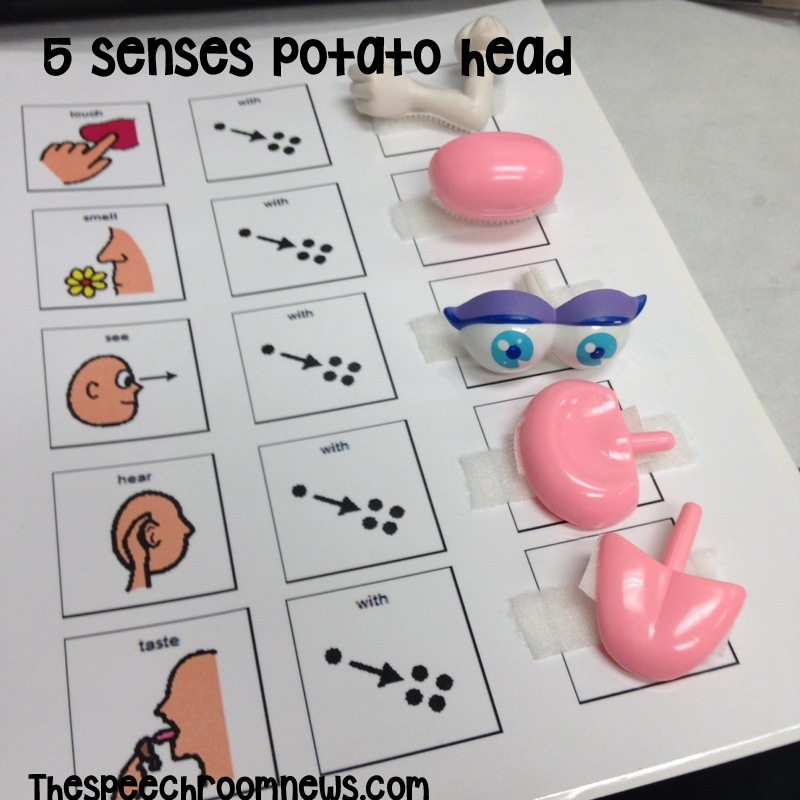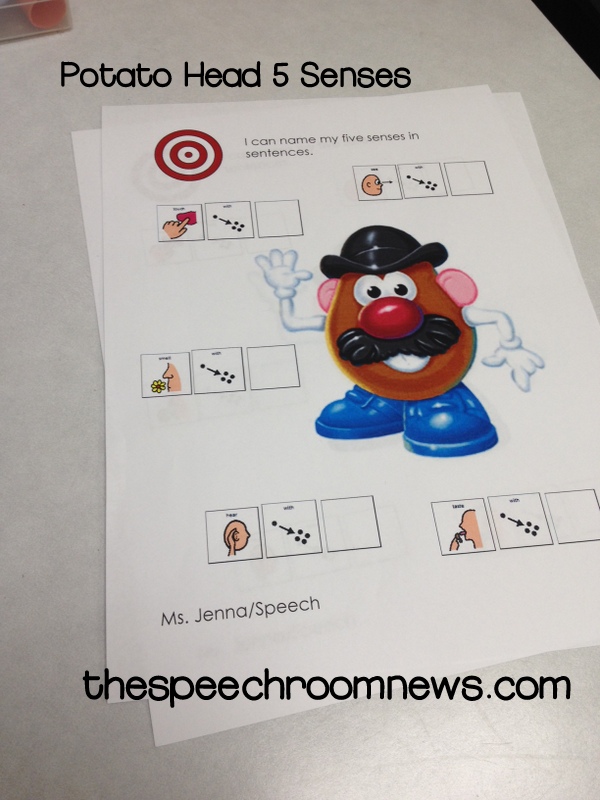When I speak to graduate students about to enter the schools each summer I always try to teach them my favorite way to do therapy. For me the best way to do therapy is to find a toy or book and use it all day with every student on your caseload. No one has time to plan separate materials for groups that are back to back all day.
Today I want to start a new series that shares different ways to use items found in your therapy closet.
1. Five Senses
We are working on the 5 senses! I added velcro pieces and had the kids complete this chart before we play.
Then we filled out this worksheet so the kids could take something home to show mom and dad! I don’t have the permission to share these files, but feel free to re-make your own. I also can’t share them on Boardmaker Share because they are in PPT and the file isn’t compatible.
2. Vowels. I have one sweet apraxic student who is working on imitating vowel sounds. I pulled out my camera phone and we practiced saying ‘eeeee’ (as in ‘cheese’) while we snapped pictures of our dressed up potatoes. We got about 50 repetitions in one session! It was awesome!
3. Same & Different. These mini figures are perfect for talking about same and different! Just change one thing and ask your student to identify it. Our school curriculum has a whole week were we talk about the differences between us so this was a biggie for my guys!
4. Categorization: Grab your bucket of toys and have the kids sort into categories. Clothes, body parts, etc.
5. Action Words: Those spuds can do a ton of things! Call, walk, break, fall, etc. Get those potatoes moving!
6. Articulation: Carrier phrases are the perfect way to work on articulation. You can also name the spud with your child’s target sound. Frank, Sally, Leo, Koko and more!
7. Social Scripts. Potato heads are a great way to act our social scripts with your students. Make a mommy and a child potato. Talk about safety routines, getting ready for school, going to the grocery stores, etc. Play is a great way to teach your students the social routines and scripts they are missing.
8. Body Parts. This one is a no-brainer but using the spuds to work on body parts is a simple way to measure receptive and expressive language.
9. Following directions. I love these toys working on following directions. Take it to the next step and have your student give you directions for building.
10. Negation. I’ve got a couple kiddos working on identifying what is ‘not.’ This is a great activity because I can prompt them to ‘hand me the hat that is not green.”
Those are 10 of my favorites! How do you use potato heads in speech therapy?
Join the SRN newsletter!

I'm so glad you stopped by! If you'd like to keep up with the newest posts and get exclusive free downloads, please sign up for the newsletter! Your first freebie is ready as soon as you subscribe and confirm your email!








Thanks for these great ideas–something so easy, but so helpful!
I use potato heads every day.
1. Following directions- for example: make me 2 regular potato heads and one silly. Be sure to fill up all the holes. This is a great way to see where their sensory system is for the day. If the regular potato heads have feet coming out of the top of their head, it’s usually a good indication that the child needs some proprioceptive input to figure out where they are in space. They will attend to the lesson better if their sensory system is more balanced. Long-term memory – build a potato head using the same hat as last week. Short term memory. Make 2 potato heads one with boots and arms that are blue and one with the mermaid tail. All of these can be down independently working without adult help.
2. Teaching boy/girl. Building the potato heads together and asking the child which gender they will help cement that.
3. Sort as you clean up. Put all the arms in this Baggie, all the shoes In this Baggie etc.
Jenna, These are great ideas, and I also like to use the same materials all day in different ways with different groups! I have used the potato heads to teach Whole Body Listening and to demonstrate on the potato if someone isn’t following along, take that body part off and say that someone is not listening with his/her _____.
I also use potato head to make requests. I want a nose etc. Then I ask which nose the blue pink etc. I can get a lot of language that way. Love potato head!
Thank you. I love using the ‘potatoe people’ in therapy. I use hem for targeting all different utterances when working on expressive syntax. If you have various figures it works well for the contrasting variables needed for LARSP therapy. I use Mr and Mrs potatoe head to teach understanding and use of pronouns such as ‘he, she, his, hers. I find that the kids absolutely love to follow and give instructions for building Mr potatoe head.
Love the great ideas! Thank you!
These are awesome ideas! My favorite is the 5 senses! (Also, I can see those parts came from the MRS. Potato, which is the potato head I’m rockin’ in my therapy room 😉 !)
Karen
pedispeechie.blogspot.com
I now need to get out and find some Potato Heads so that I can try out all of these fantastic ideas – this has been a super post plus follow up comments I will be sharing with others – thank you, thank you, thank you!!
Special Teaching at Pempi’s Palace
I always use Mr. & Mrs. Potato Head for subjective and objective pronouns for my students who have difficulty with gender concepts!
You are just so clever. Truly a gifted speech-language pathologist!
Thank you! Great ideas. Can’t wait to see more in this series!
I love Mr Potato head for therapy. It’s always great to have some new ideas for therapy.
I obviously need to buy more potato heads! I have one and we use it for a lot of different things, but I can see where having more would be even better! Awesome post! Thanks.
These are great ideas!! Thanks so much for sharing!
I use Mr. Potato Head to expand utterances: “I found a ……” “My potato has a ………” and wh questions. I love your ideas though, must add them to my bag of potato tricks! Thanks!